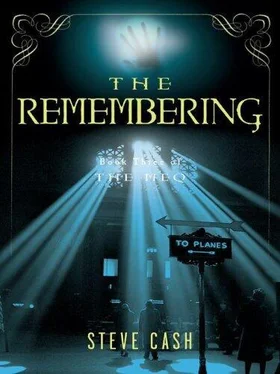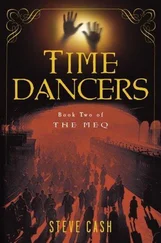“Judging from the music and voices, I would assume the great ballroom. It is only one room away.”
“Where is the room containing the sphere and the artifacts?”
Giles looked at both of us with concern. “Unfortunately, that room is located at the other end of the dacha, all the way down the long hall in the center.”
“Will it be guarded?” I asked.
“From what we have seen so far, I would say so. I would not be surprised if there were men stationed throughout the dacha. The Soviets distrust their enemies and their friends.”
Geaxi and I glanced at each other. We hadn’t wanted to, but now we knew we might have to use the Stones. “When will it be best for us to slip away?” Geaxi asked.
“After the performance,” Giles said. “I shall find a way to create a disturbance … a slight distraction,” he added with a wink. He looked around the room at the Zhordanias. Some were exercising and stretching, some were doing cartwheels and back handsprings with full twists. “Have you practiced what I told you?” he asked Geaxi.
Just then the banquet-hall door opened and the two men in dark suits reappeared, along with a third man, also in a dark suit, carrying several bottles of vodka on a tray.
“Yes,” Geaxi whispered to Giles, “we are ready, are we not, Zianno?”
I hesitated a moment, watching the three unsmiling Russians. “I hope so.”
At ten minutes to six, the music stopped. At five minutes to six, we were led down the hall and through the double doors of the great ballroom. Inside, everything was brightly lit by two gigantic and elaborate chandeliers hanging forty feet over our heads. Dozens of people, including teenagers and children, sat at long tables facing the center of the room. They were all applauding as we walked into the light. After a few seconds, a middle-aged woman to our right stood and motioned for the applause to cease. She then spoke to us in a loud, strident voice. “Before the performance commences, the Premier of the Union of Soviet Socialist Republics would like to welcome each of you personally. Please come forward.” This was unexpected. I glanced at Geaxi, then Giles, who was standing near the double doors. He shrugged his shoulders slightly, as if to say “nothing to worry about.”
Nikita Khrushchev stood between two of his aides. He was smiling wide and almost giggling as we approached. With Giorgi leading, we walked by in single file. I was last in line. He shook the hand of everyone and nodded without speaking; that is, everyone except me. For some reason, he decided to ask me a question about being so young and still being a professional acrobat. I froze. I understood the question and I could speak some Russian, yet I knew if I did, it would be with an obvious Western accent. He repeated his question and I said nothing. The Premier’s smile began to fade. My heart was pounding. Finally, I opened my mouth and just as I was about to speak, Geaxi stepped forward. In perfect Russian, she said, “I am sorry, sir, but my brother is mute.” Nikita Khrushchev looked down at me with pity, patted my head, and I moved on to join the others with a sigh of relief.
The show went surprisingly well. Using a boost from two other Zhordanias, Noe led it off with a dramatic triple flip, landing like a feather on Giorgi’s broad shoulders. Geaxi made all her moves with flawless precision, and I was adequate enough to not draw any attention or suspicion. During the final act, the famous four-tiered pyramid, Noe nearly scraped one of the chandeliers as he tumbled through the air, and the entire audience burst into spontaneous, wild applause. Waving to the crowd, we circled the great ballroom in a slow trot, then headed toward the double doors to make our exit.
Giles was waiting for us, whooping, hollering, and whistling louder than anyone else in the ballroom. Once Geaxi and I had reached the doors, he raised something in the air and turned, spilling and splashing the contents on the floor around him. It was one of the bottles of vodka that the man in the dark suit had delivered. Giles was feigning a state of drunkenness for all to witness. He took a sloppy sip and wiped his mouth with the sleeve of his jacket, then made a wobbly step toward Nikita Khrushchev’s table. He held the vodka bottle above his head and yelled, “I propose a toast to our illustrious leader, Comrade Khrushchev, on the occasion of his glorious birthday!” He took another big gulp and seemed to accidentally drop the bottle. It fell to the hardwood floor with a loud crash, sending broken glass and vodka in every direction. Immediately, five men in dark suits, including two that were guarding the long hallway, rushed over to Giles, who had stumbled and fallen in a drunken heap. Geaxi grabbed my arm and we seized the moment, running swiftly down the length of the hall without anyone noticing. The whole event had taken less than thirty seconds — a perfect “distraction.”
The hallway was dimly lit, yet it was clear as we slowed to a walk that the room we sought was unguarded. And not only was the room unguarded, the door was unlocked and wide open. “Unusual,” Geaxi whispered. Both of us held our Stones at the ready, fully expecting we would need to use them. Without making a sound, Geaxi crept into the room. I glanced once back down the hallway, saw no one, and followed her inside.
Only a few lamps lit the cavernous room. One was near the door, on a table by a refrigerator and a small stove. The other two were in the far right corner, at either end of a large desk. The room itself was just as Giles had described it — high ceilings, large windows with iron bars on the outside, and cluttered throughout with hundreds of artifacts from all over the world, representing almost every culture and civilization. On first glance I saw an Egyptian sarcophagus next to an ancient bronze Chinese funerary urn with an African butterfly collection leaning against it. I saw an assortment of Babylonian ceremonial swords, along with Assyrian crossbows and an Aztec mask stacked up against a life-size marble statue of Aphrodite. It was an amazing, eclectic array of items and objects, all brought together in this one room without any apparent purpose or design. I looked around for Geaxi. She was standing in the far right corner and staring at something just beyond the desk with the lamps. “Here, young Zezen,” she said. “The prize is here.”
I hurried over to where Geaxi was standing, and as I made my way around the oversize desk, I noticed pages and pages of tracing paper spread across the desktop. They were each covered with odd-shaped lines, dots, half-moons, circles, and combinations of all four in multiple patterns. Several books on hieroglyphic languages, as well as books on codes and ciphers, were laid open on a bench next to the desk. Then I turned and saw the sphere. Perched like a circular egg on top of a wooden pedestal, the stone ball was perfectly round, and its polished black granite reflected the light of the two desk lamps. It was darker and slightly smaller than the one I’d seen in Cuba, but I could feel its silent power and mystery from where I stood. There were three bands of tiny markings etched into its surface, the same markings that someone had been copying onto the tracing paper. I knelt down and stared at the sphere in wonder.
“Beautiful, no?” Geaxi said.
“Yes … yes,” I mumbled. “More than beautiful.”
“Can you make anything of it, Zianno? Can you read it?”
“I … I don’t know. I’m not sure. Give me a minute or two.”
“Two is more than we can allow. You have one minute, then we must return.”
“All right, then,” I said. “One minute.”
I began by taking a deep breath and letting it out slowly. I put my hands on the sphere and turned it, inch by inch, hoping to find a starting place in the bands of markings. But they were continuous, as if there was no beginning or end. I leaned in closer and examined each individual marking. Every single line, dot, circle, and half-moon was etched with the exact same precision, depth, and clarity. The sphere was a masterwork of stonecutting and stone polishing. Where had it been done? For what purpose, and most important, by whom? I had no answers, and the clock was ticking. Then, without thinking, I closed my eyes and let my fingertips dance lightly around the sphere, barely making contact with the markings, and something remarkable happened. Like a blind man reading braille, I suddenly understood one word— West . I read another word and then a phrase. It was the same phrase I had once discovered and deciphered in a cave in the middle of the Sahara Desert— “Where Time is under Water, Where Water is under Time.” I opened my eyes and turned to tell Geaxi, but she was no longer beside me. She was standing by an exhibit ten feet away, holding something in one hand and gazing at it with her mouth hanging open. “Geaxi!” I said. “I can read the sphere!” She didn’t respond or even blink. Her breathing was shallow and uneven. She seemed frozen, transfixed by what she was holding. I walked over to her and tapped her on the shoulder. Still, she didn’t respond. I looked down and saw that she was holding a skull. The skull was human, yet not quite like modern humans. The browridges were raised and much more pronounced. Also, the forehead sloped and the jaw was different. And it was most likely a child’s skull because it was too small to be that of an adult.
Читать дальше












